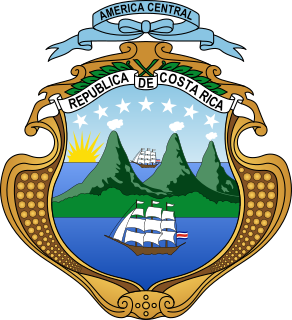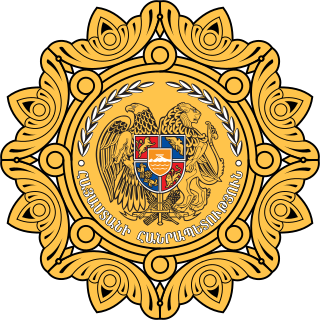Albania is a unitary parliamentary constitutional republic, where the President of Albania is the head of state and the Prime Minister of Albania the head of government in a multi-party system. The executive power is exercised by the Government and the Prime Minister with its Cabinet. Legislative power is vested in the Parliament of Albania. The judiciary is independent of the executive and the legislature. The political system of Albania is laid out in the 1998 constitution. The Parliament adopted the current constitution on 28 November 1998. Due to political instability, the country has had many constitutions during its history. Albania was initially constituted as a monarchy in 1913, briefly a republic in 1925, then it returned to a democratic monarchy in 1928. It later became a socialist republic until the restoration of capitalism and democracy in 1992.
A constitutional amendment is a modification of the constitution of a polity, organization or other type of entity. Amendments are often interwoven into the relevant sections of an existing constitution, directly altering the text. Conversely, they can be appended to the constitution as supplemental additions (codicils), thus changing the frame of government without altering the existing text of the document.

The President of the Republic of Costa Rica is the head of state and head of government of Costa Rica. The president is currently elected in direct elections for a period of four years, which is not immediately renewable. Two vice presidents are elected in the same ticket with the president. The president appoints the Council of Ministers. Due to the abolition of the military of Costa Rica in 1948, the president is not a commander-in-chief, unlike the norm in most other countries, although the Constitution does describe him as commander-in-chief of the civil defense public forces.
A decree is a rule of law usually issued by a head of state, according to certain procedures. It has the force of law. The particular term used for this concept may vary from country to country. The executive orders made by the President of the United States, for example, are decrees.

The Constitution of the Czech Republic is the supreme law of the Czech Republic. The current constitution was adopted by the Czech National Council on 16 December 1992. It entered into force on 1 January 1993, replacing the 1960 Constitution of Czechoslovakia and the constitutional act No. 143/1968 Col., when Czechoslovakia gave way to the Slovak Republic and the Czech Republic in a peaceful dissolution.

The Constitution of the Italian Republic was enacted by the Constituent Assembly on 22 December 1947, with 453 votes in favour and 62 against. The text, which has since been amended sixteen times, was promulgated in an extraordinary edition of Gazzetta Ufficiale on 27 December 1947. The Constituent Assembly was elected by universal suffrage on 2 June 1946, on the same day as the referendum on the abolition of the monarchy was held. The election was held in all Italian provinces. The Constitution was drafted in 1946 and came into force on 1 January 1948, one century after the Constitution of the Kingdom of Italy, the Statuto Albertino, had been enacted.

Dziennik Ustaw or Dziennik Ustaw Rzeczypospolitej Polskiej is the most important Polish publication of legal acts. It is the only official source of law for promulgation of Polish laws. The publication of this journal is solely the responsibility of the Prime Minister of the Republic of Poland. 'Dziennik Ustaw' traces its history to the 1918 'Dziennik Praw Królestwa Polskiego' and has changed its name several times during its existence.

The president of Artsakh is the head of state and head of government of the de facto Republic of Artsakh.
The present Constitution of Albania was adopted by the Parliament of Albania on 21 October 1998. It is split up over many different acts. The document succeeded the 1976 Constitution, originally adopted at the creation of the People's Socialist Republic of Albania on 28 December 1976 and heavily amended on 29 April 1991.

The Constitution of Kosovo, refers to the supreme law of the Republic of Kosovo. Article four of the constitution establishes the rules and separate powers of the three branches of the government. The unicameral Assembly of the Republic exercises the legislative power, the executive branch led by the President and the Prime Minister which are responsible for implementing laws and the judicial system headed by the Supreme Court.
The law of the Republic of China as applied in Taiwan is based on civil law with its origins in the modern Japanese and German legal systems. The main body of laws are codified into the Six Codes:

The Constitution of the Philippines is the constitution or supreme law of the Republic of the Philippines. Its final draft was completed by the Constitutional Commission on October 12, 1986 and was ratified by a nationwide plebiscite on February 2, 1987.
Part Three of the Constitution of Albania is the third of eighteen parts. Titled The Assembly, it is divided into 4 chapters that consist of 22 articles.
Part Five of the Constitution of Albania is the fifth of eighteen parts. Titled The Council of Ministers, it consists of 13 articles.
Part Six of the Constitution of Albania is the sixth of eighteen parts. Titled Local Government, it consists of 8 articles.
Part Eight of the Constitution of Albania is the eighth of eighteen parts. Titled Constitutional Court, it consists of 11 articles. Together with Part Nine (The Courts), and Part Ten (The Office of the Prosecutor) underwent radical changes in 2016 during the so-called Justice Reform, which were the efforts of lawmakers to fight corruption, organized crime, nepotism in the justice system.

The Constitutional Court of Armenia is the highest legal body for constitutional review in Armenia. It is a judicial body which is separate and independent from the executive, the legislative and the judiciary. It is responsible for supervising the constitutionality of laws and other legislative instruments. The law of constitutional court of Armenia is defined both in Armenian constitution and in law.

The president of Armenia is the head of state and the guarantor of independence and territorial integrity of Armenia elected to a single seven year term by the National Assembly of Armenia. Under Armenia's parliamentary system, the president is simply a figurehead and holds ceremonial duties, with most of the political power vested in the Parliament and Prime Minister.
Part One is a compilation of laws pertaining to the Constitution of Albania, that consists of fourteen articles. This part of the Constitution is the first of eighteen parts.
Part Eleven of the Constitution of Albania is the eleventh of eighteen parts. Titled Referendum, it consists of 3 articles.









